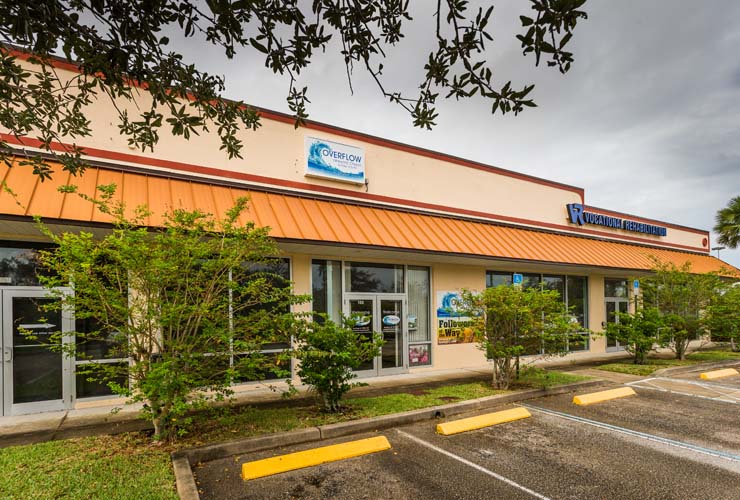
It was November 2009, in the darkest days of the Great Recession, when Lori Biermann and her late husband responded to their church’s call for help. The couple loaned $40,000 to Vero Vineyard Christian Church to help it through a rough patch, accepting the treasurer’s offer of a 120-month repayment plan at 9 percent interest.
The idea was that loans from the Biermanns and other congregants would help the church bridge a cash-flow crisis, expand and increase its income enough to repay the money.
It didn’t work out that way.
Today, Biermann finds herself nearly $30,000 in the hole and facing mounting legal fees as she sues to get her money back. The church on 20th Street, where she raised so many of her prayers, has dissolved, and Tony Valentino, pastor at the time of the loan, resigned after “multiple moral failures” were divulged, according to William Mefford, who took Valentino’s place.
Valentino took with him $20,000 when the church shut down – revenue from a 2016 sale of the church building – Mefford writes in a June 19 letter to the court, which attempted to explain the circumstances of the loan and disclaim responsibility for repayment.
But a judge Thursday said Biermann’s case can still go forward. Judge Paul Kanarek said that the hand-written explanation filed by Mefford was a legally insufficient response.
Corporations can only be represented by a lawyer, he said, giving the now defunct church 20 days to retain counsel and file a response to Biermann’s suit. If it doesn’t, Kanarek warned, the next step will be to enter a default judgement on Biermann’s behalf.
“They took advantage of these people,” said Biermann’s lawyer, Leonard Villafranco outside of the courtroom. “They preyed on their generosity and their love of God and [Biermann and her late husband] . . . loaned them a large sum of money so that they could build their building and improve the church and then they didn’t pay them back.”
“I think it’s terrible that a church would take advantage of parishioners, especially somebody who just lost her husband,” he later added.
A default judgment would give Biermann the legal right to collect the funds she is due, the attorney said – if she can find someone to collect from.
The judge’s order will permit her to go after the principals of the failed organization, said Villafranco. “If the church distributed money improperly, or the personnel at the church did, then they can be held liable,” he said. “But, it’s difficult.”
In the 2009 solicitation, the then-church treasurer explains funds were needed because a bank had called in Vero Vineyard’s loan and $136,000 was needed to avoid foreclosure.
“We did a significant amount of remodeling here,” David Lewis wrote. “Altogether, we invested over $450,000 in the sanctuary, café, offices, Kids Church, nursery and our music equipment and furnishings. Unfortunately, we had only raised around $300,000.”
An information sheet attached to the letter addresses the question of whether or not a parishioner’s loan to the church is safe. “Church notes are not secured, and are only as secure as the church is,” Lewis writes. “But think about it. How secure is any investment these days? How many of us have put our faith in the stock market or the real estate market, only to see the value of our investments turn into pennies on the dollar? In the meantime, our church has had an exemplary record . . .”
But Mefford says by the time he joined the congregation in 2014, the financial situation was starkly different. Vero Vineyard had moved its congregation to 27th Avenue and the church’s debt was more massive than anticipated.
In his notice to the court, the minister says pastor Valentino prioritized his salary over the church’s debts.
“Mr. Valentino was only present at services on occasion,” Mefford recalls in the letter. He “would come in late, and after the offering was taken up would leave with the money as he and his wife were in possession of the church checkbook and took care of the finances.”
Valentino could not be reached for comment, but Mefford notes he resigned in 2015.
The next year, the board put the church’s building on the market.
Fearing legal action by the former pastor, the board decided to pay Valentino first, getting him to agree to a $20,000 settlement. It then paid its utility bill and a security deposit and the first-month’s rent for Mefford’s new church, Overflow Church of Vero Beach. This left just $1,000 for the widow.
“All we were required to do was liquidate the assets and give everybody what was left and that’s what we did,” said Mefford, reached by phone.
Biermann, it seems, doesn’t blame Mefford for her loss. In February 2017, she released the pastor and his new church from the outstanding debt.
Mefford was not with Vero Vineyard at the time of the loan but many of the church’s parishioners followed him to the Overflow Church.
In January, he told the widow that the Overflow church was no longer able to donate money to pay off Vero Vineyard’s debts.
The whole situation is a mess, Mefford said with a deep sigh. “There’s nothing that can be done.”



